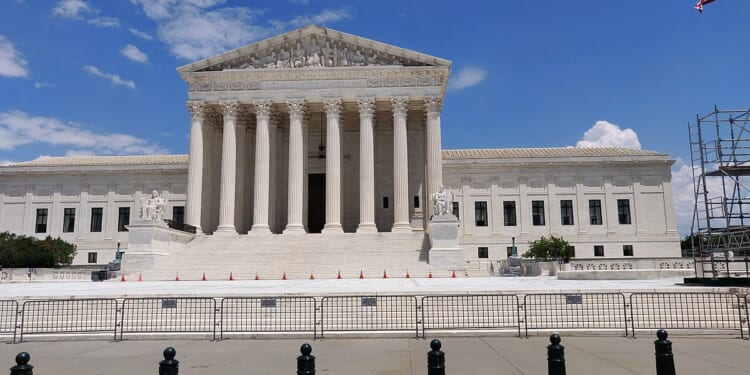The U.S. Supreme Court blocked a lower court order on Friday afternoon that attempted to prevent President Trump from cutting billions of dollars’ worth of foreign grants.
In a 6-3 decision, the high court placed a temporary stay on a preliminary injunction issued by the U.S. District Court for the District of Columbia. That order tried to prevent Trump from cutting $4 billion in foreign aid approved by Congress (a “pocket recession”) under the Impoundment Control Act.
The Trump administration filed its emergency request with the justices after its application for relief was denied by the D.C. Court of Appeals.
Associate Justices Sonia Sotomayor, Elena Kagan, and Ketanji Brown Jackson would have denied the administration’s request.
In its Friday order, SCOTUS determined that the federal government “at this early stage, has made a sufficient showing that the Impoundment Control Act precludes respondents’ suit, brought pursuant to the Administrative Procedure Act, to enforce the appropriations at issue here.” The majority further noted that the administration “has also made a sufficient showing that mandamus relief is unavailable to respondents,” and that “on the record before the Court, the asserted harms to the Executive’s conduct of foreign affairs appear to outweigh the potential harm faced by respondents.”
“This order should not be read as a final determination on the merits. The relief granted by the Court today reflects our preliminary view, consistent with the standards for interim relief,” the majority stated.
Writing for the dissent, Kagan recognized the majority’s admission that the court’s order is “only a ‘preliminary view’ of the issues raised” in the case, but claimed that “even at that, the majority goes too far.” She further argued that the administration “has not met our standard for emergency relief — the appropriately high bar we have erected because a stay like this one disrupts ‘the ordinary processes of administration and judicial review.’”
“I appreciate that the majority refrains from offering a definitive view of this dispute and the questions raised in it,” Kagan wrote. “But the effect of its ruling is to allow the Executive to cease obligating $4 billion in funds that Congress appropriated for foreign aid, and that will now never reach its intended recipients. Because that result conflicts with the separation of powers, I respectfully dissent.”
The Supreme Court’s temporary stay on the lower court’s injunction will remain in effect “pending the disposition of the Government’s appeal in the United States Court of Appeals for the District of Columbia Circuit and disposition of a petition for a writ of certiorari, if such writ is timely sought.” The stay will terminate if a potential petition from the administration to SCOTUS is denied by the high court or if SCOTUS agrees to consider the matter and issue a final judgment in the case.
Shawn Fleetwood is a staff writer for The Federalist and a graduate of the University of Mary Washington. He previously served as a state content writer for Convention of States Action and his work has been featured in numerous outlets, including RealClearPolitics, RealClearHealth, and Conservative Review. Follow him on Twitter @ShawnFleetwood

















